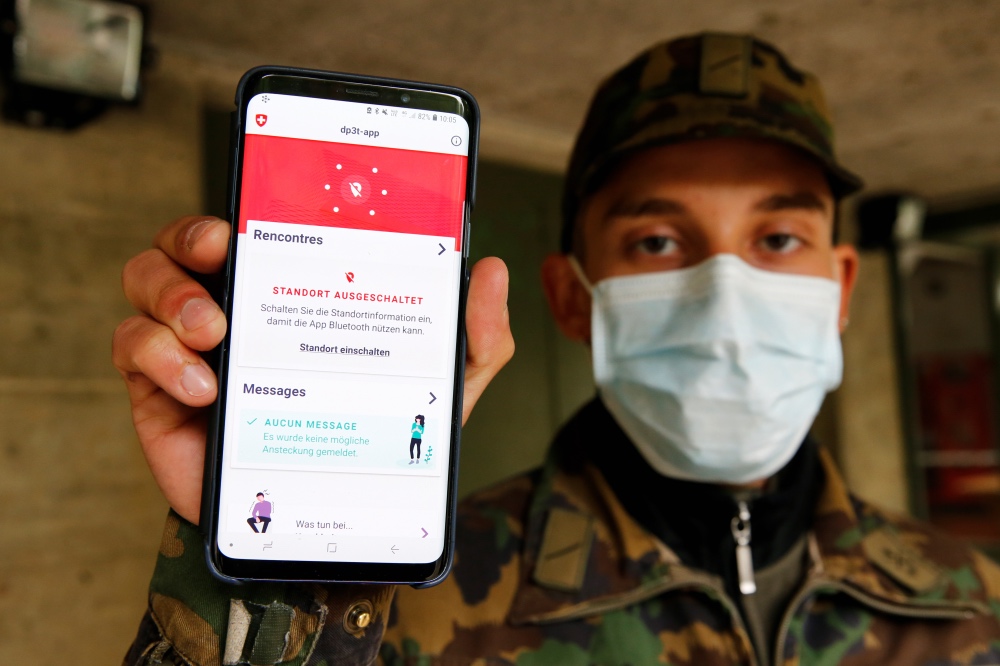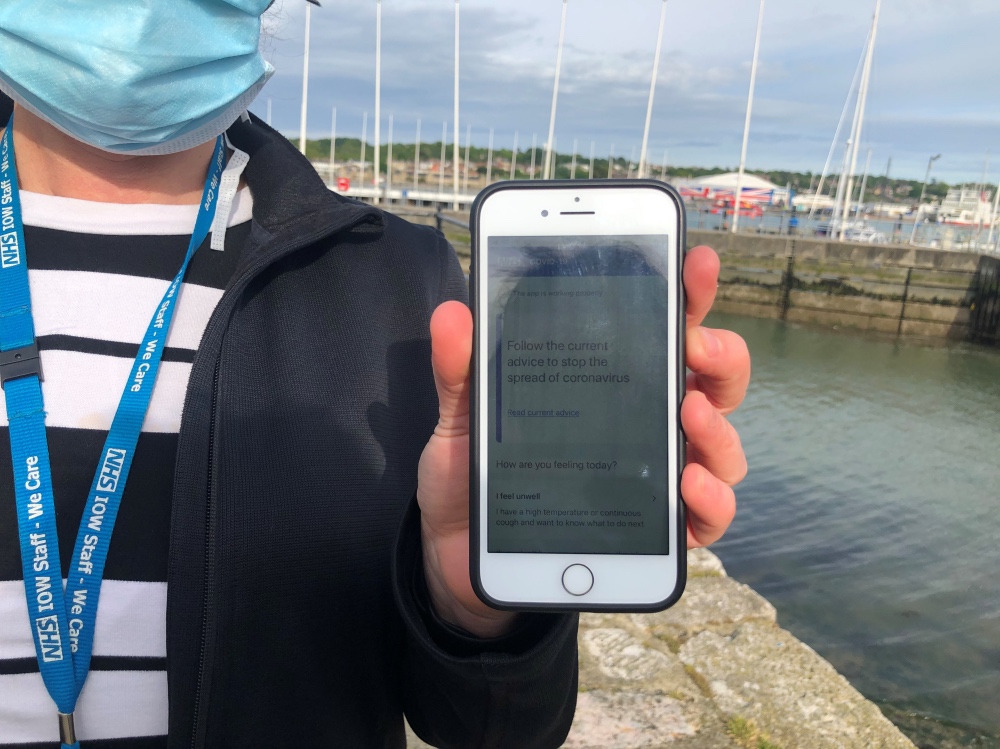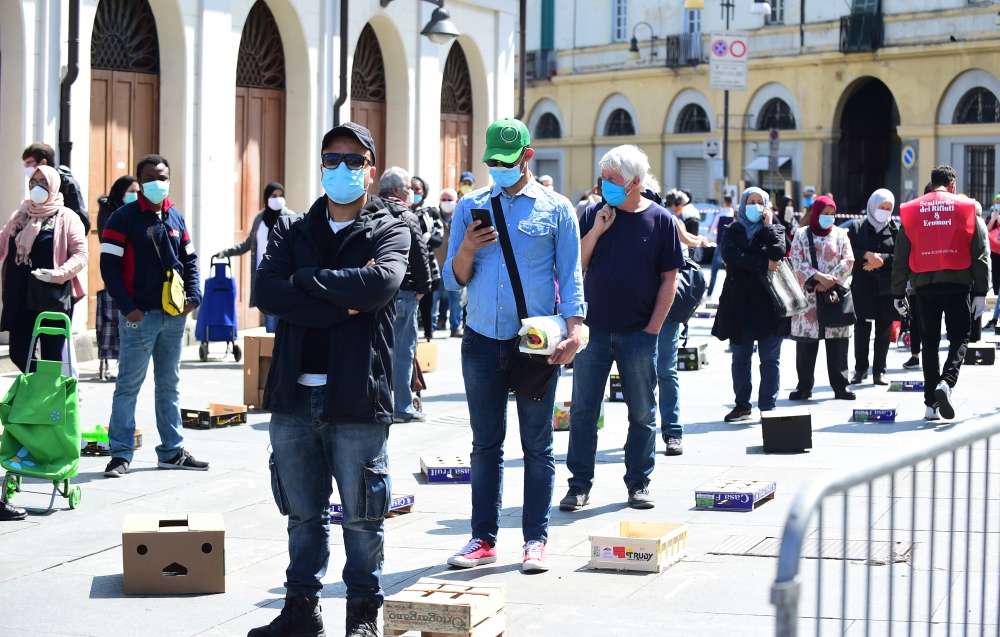
UMBERTO BACCHI, of Thomson Reuters Foundation, reports on how countries are using tracing apps to help tackle the spread of COVID-19…
Tbilisi, Georgia
Thomson Reuters Foundation
As countries around the world ease the lockdowns that have been crippling their economies, the race is on to develop smartphone apps to help contain the spread of the novel coronavirus when people are no longer confined to their homes.
Scientists say contact tracing is key to prevent a resurgence of the virus, by tracking down infected people and finding everyone who has been near them, so they can get tested or quarantined.

A Swiss soldier shows on a mobile device the contact tracking application created by the Swiss Federal Institute of Technology Lausanne (EPFL), using Bluetooth and a design called Decentralised Privacy-Preserving Proximity Tracing (DP-3T), which will be launched on 11th May by the Swiss Government for easing of the lockdown caused by the coronavirus disease outbreak, at the Chamblon barracks, Switzerland, on 30th April. PICTURE: Reuters/Denis Balibouse
On Tuesday, Britain started testing its own COVID-19 tracing app on the Isle of Wight, off the south coast of England. It joins Australia, Israel, Singapore and other nations in rolling out such tools.
But the tech race has raised privacy and accuracy concerns among rights groups and technology experts.
“A mobile app alone is not enough…It needs to be part of a bigger effort.”
– Thomas Hardjono, chief technology officer for the Connection Science program at the Massachusetts Institute of Technology.
And the question of whether the apps can deliver on their promise is a matter of debate, with researchers warning that mobile phones are no silver bullet against COVID-19.
“A mobile app alone is not enough,” said Thomas Hardjono, chief technology officer for the Connection Science program at the Massachusetts Institute of Technology, which has built its own app.
Further research to better understand the virus and consistent testing efforts would be needed to complement any contact tracing app, he said. “It needs to be part of a bigger effort.”
Worldwide, about 3.7 million people have been infected by the respiratory disease and more than 250,000 have died, according to a Reuters tally.
Contact tracing has been used for decades to control the spread of infectious diseases and is normally carried out by public health investigators who interview patients to find out who they have met and where they have been in the previous days.
But with almost half of novel coronavirus transmissions occurring before symptoms appear, traditional methods are too slow to keep up, researchers say.
A report published in April by the Johns Hopkins Center for Health Security in Maryland said the United States needed 100,000 more contact tracers to effectively tackle the pandemic.
Given the virus’ rapid spread, even a single day’s delay in contact tracing could be the difference between getting the virus under control and suffering a resurgence, according to researchers from the University of Oxford in Britain.
Here is where health experts say apps can help.

UK National Health Service employee Anni Adams shows a smartphone displaying the new NHS app to trace contacts with people potentially infected with the coronavirus disease being trialled on Isle of Wight, Britain, on 5th May. PICTURE: Reuters/Isla Binnie
Smartphones keep track of their location via cell-tower signals, wi-fi signals and the satellite-based global positioning system, known as GPS.
Through Bluetooth technology, which allows devices to connect to others nearby, phones can also log other phones that have come within a few metres of them.
Using that data, contact tracing apps can instantly inform users if they have come into contact with someone who has tested positive for COVID-19, and advise them to call a doctor, get tested or self-isolate.
But the prospect of widespread data collection worries some citizens and civil rights groups like European Digital Rights.
The use of GPS and other geolocation data could provide authorities with a detailed map of a user’s every movement, leaving the door open to abuse, said Diego Naranjo, head of policy at the digital civil rights group.
“Decentralised is the best option. It gives more power to the individual and diminishes the risk.”
– Diego Naranjo, head of policy at European Digital Rights.
“That gives [authorities] a very accurate description of your reality and who you are…it should be avoided at all costs,” he told the Thomson Reuters Foundation by phone.
If the data were to become public, people at risk of infection could face discrimination and the places they visited become ostracised, privacy activists say.
Apps that work only through Bluetooth could offer more privacy protections because they amass less information, collecting only data about who people meet but not where they are, said Naranjo.
Yet, issues remain around who can view a phone’s list of the devices it has connected with, known as “handshakes”.
Some states favour storing all the data on a central server, while others prefer a system in which Bluetooth logs would be kept on individual devices.
Centralised systems are easier to design and manage and would allow health authorities access to more information, but privacy advocates say they could also expose millions of people’s personal data to hacks and leaks.
“Decentralised is the best option,” said Naranjo. “It gives more power to the individual and diminishes the risk.”

People wearing protective face masks queue at Porta Palazzo market in Turin after it reopened with social distancing rules as Italy begins a staged end to a nationwide lockdown, following the outbreak of the coronavirus disease, Turin, Italy, on 4th May. PICTURE: Reuters/Massimo Pinca
Contact tracing apps are also not foolproof, tech and biology experts have warned.
GPS or cell tower location data can wrongly record everyone on a busy city block as contacts.
Similarly, Bluetooth can log phones that are near each other but separated by walls, although developers have been working on ways to better define “contacts” based on the length and strength of the handshakes between devices.
Apps also do not take into account whether users who have been in contact with others were wearing protective equipment at the time, according to researchers from the Brookings Institution, a Washington-based think tank.
This raises the possibility of an app flagging someone as being in danger of infection even if, in reality, the risk is minimal, the researchers say.
“There is a real risk that these mobile-based apps can turn unaffected individuals into social pariahs, restricted from accessing public and private spaces or participating in social and economic activities,” they wrote in an article last month.
Another challenge is take up, with some epidemiologists saying at least 40 per cent of a country’s population needs to activate digital contact tracing for the system to be effective.
In Singapore, only about one in five people have downloaded a government-backed Bluetooth-based contact tracing app since it launched in March as of the time of writing.
About five million Australians have so far installed a similar app that was launched last week.
And a poll released in April by the Washington Post and the University of Maryland found more than half of all Americans either do not own smartphones or would not use the contact tracing app being developed by tech giants Google and Apple.
Yet, even with all their limitations, apps could still prove useful – if only because there is no alternative, said Hardjono of MIT.
“Right now, this is all we have,” he said.





